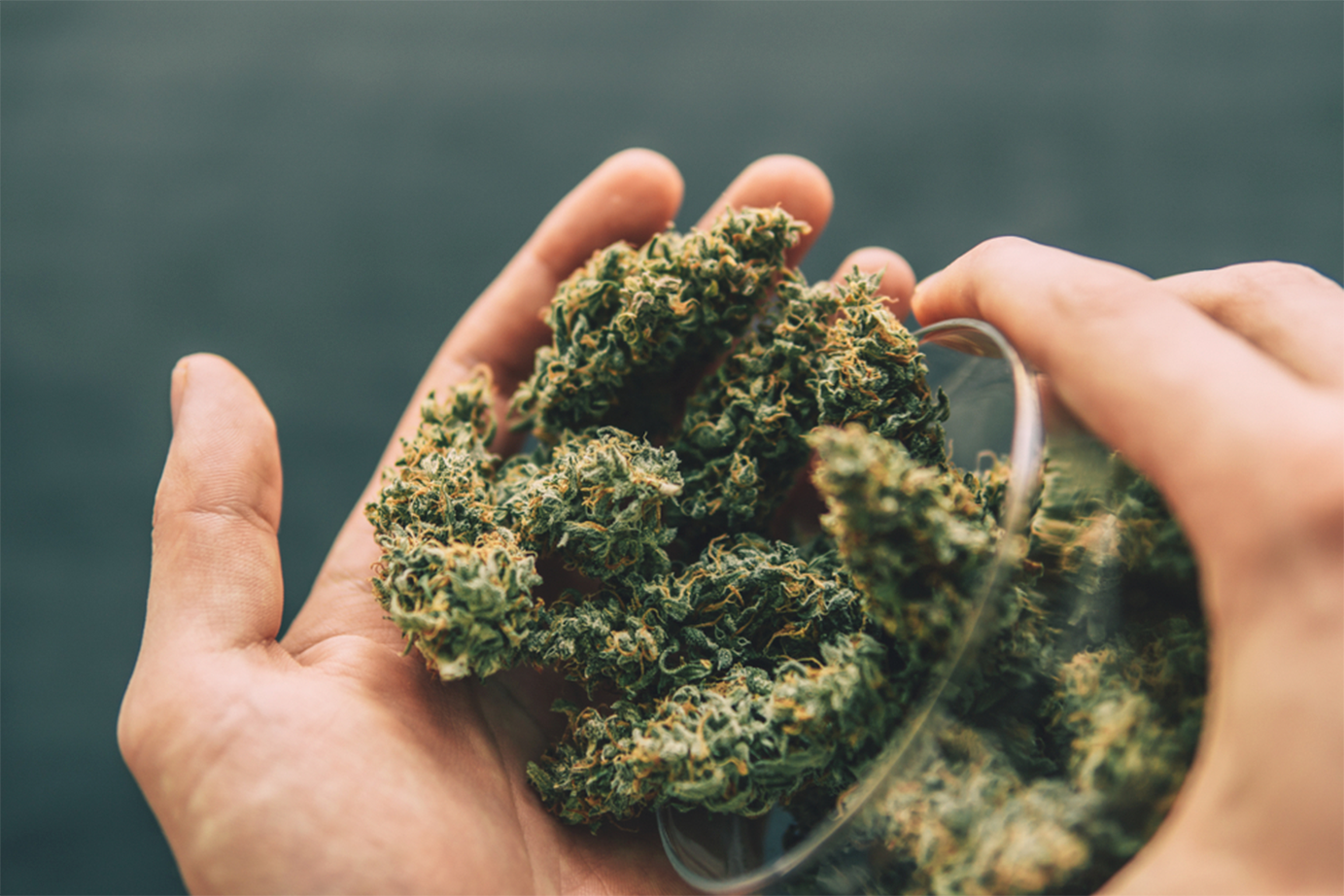CBD dispensaries have popped up in many states all over the country in people’s hunt for wellness. But CBD oil can also be used to help dogs with anxiety and other issues. What is CBD, and how does it work? And, will it give your dog the munchies? First, let’s define some of the terms that can be confusing.
“Cannabidiol, also known as CBD, is a cannabinoid — a naturally occurring compound found in both hemp and cannabis (cannabis also referred to as marijuana),” says Jodi Ziskin, director of communications with Treatibles in Petaluma, California.
Hemp and marijuana are “Both members of the Cannabis sativa plant and share similarities but have very distinct differences due to each plant’s biological structure,” says Jon Neveloff, partner with King Kanine in Fort Lauderdale, Florida. Consider that a rice cake and rice pudding are from the same plant but quite different.
“CBD is one of the hundreds of compounds found in cannabis. It is the most prevalent compound in hemp. Which is a special strain of cannabis that has only trace amounts of THC, the substance in medical and recreational strains of hemp that is associated with psychoactive effects,” says Joey DiFrancesco, CEO and founder of LolaHemp in New York City. This is crucial because THC can be toxic to pets. (For more THC specifics, see “Why the Farm Bill Matters” on page 38.) “CBD is non-psychoactive,” Joey adds. It won’t get your dog high in any way.
Hemp Oil vs. CBD Oil
Both CBD oil and hemp oil come from the same plant, but CBD oil comes from the flowers, leaves, and stalk of the hemp plant, while hemp oil comes from the seeds of the industrialized hemp plant.
Hemp oil is a nutritional supplement full of nutrients that can be used in cooking and for moisturizing — like in soaps or lotions. It has a variety of other manufacturing uses, such as making plastic and bio-diesel fuel.
CBD oil is a supplement used for medicinal purposes, like treating various conditions, such as inflammation and anxiety, among others.
Help for anxiety
Many owners report benefits when using CBD oil for dogs, and CBD oil is said to assist with many ailments that plague our furry friends, including anxiety.
“The most common conditions that relate to anxiety include location and separation anxiety, as well as noise phobias,” says Annie Chrysler, CBD specialist, and product manager with SpaRoom based in Cleveland, Ohio. “For example, CBD oil can provide noticeable relief to dogs who demonstrate car ride anxiety or who experience anxiety when visiting the veterinarian’s office. CBD oil can also provide noticeable relief for dogs who have noise sensitivities such as fireworks and thunderstorms.”
Amanda Howland, co-founder and CTO of ElleVet Sciences in Portland, Maine, explains further. “Pain and anxiety are so interrelated in dogs that we wanted to have both a profound anti-anxiety effect and an extremely effective pain management effect, to help the pet feel better in every way.”
Angie Krause, DVM, with Boulder Holistic Vet in Boulder, Colorado, says in her experience CBD is consistently effective for treating dogs with mild to moderate anxiety. “For severe generalized anxiety, I have more success with drugs like Prozac,” she adds.
So how does it work? Everything is science is based, the same science that explains how CBD works with man and man’s best friend, who have some biology in common. That’s because all mammals have an endocannabinoid system (ECS.)
Jillian Dutson, marketing and advertising manager with Pet Releaf, based in Littleton, Colorado, explains. “When your dog consumes CBD, his ECS is activated. The ECS works as a two-way communication system with various systems in the body, such as the immune, nervous and digestive systems, just to name a few. This two-way communication allows these parts of the body to speak to one another to help them function at optimal levels of health.”
And there’s more to it: “Although further studies are needed, initial findings show that CBD binds to several endocannabinoid receptors,” says Lauren Brychell, marketing coordinator for a CBD company in Charlotte, North Carolina. “These receptors regulate everything from inflammation to pain perception, and CBD has shown the ability to potentially raise dopamine levels and improve mood while reducing symptoms of anxiety.”
Speaking of studies, “Most of the research done on cannabidiol, indeed cannabis writ large, has taken place outside of veterinary research, which is not uncommon, as vet research typically lags behind human medicine,” Joey says.
More benefits and dosage
There are many common uses for CBD oil in dogs, other than anxiety. “I use CBD for dogs with seizures, arthritis, cancer, pain, chronic inflammation, and allergies,” Dr. Krause says.
Joey, too, cites success in using CBD for the Big C. It can “Shrink tumors in several types of cancer both because it appears to have antitumorigenic properties of its own and because it appears to enhance the effectiveness of some chemotherapy agents.”
CBD oil can also be used to treat the following ailments:
- Sleep issues
- Vomiting and nausea
- Muscle spasms
- Glaucoma
- Digestive problems and appetite loss
- Skin conditions
As with any supplement or medication, getting the correct dose is crucial. Many of the manufacturer’s state dosing suggestions should be determined based on each dog’s stats and condition. Some suggest generic guidelines as a starting point: 1 mg per 10 pounds of body weight twice a day; Dr. Krause recommends 0.5 mg/kg of CBD twice daily for anxiety.
Of course, always get input from your dog’s vet on any treatment. “First, many symptoms that CBD may help with can be an indication of a deeper and more serious medical problem in need of treatment,” Joey says. “Second, CBD oil can interfere with the metabolization of other drugs (in a similar way that grapefruit does). Third, the answer to dosing questions is dependent on what condition you are treating.”
And don’t assume you and Fido are in for a quick fix. “While some dog owners may notice an immediate difference in their pet, we suggest waiting two to three weeks to see the full effects,” Lauren says.
Giving to your dog
Whatever the dosage, you have a couple of options on how to administer CBD oil: topically or ingested. But which is better?
“The answer ultimately depends on the individual dog,” Annie says. “More commonly, topical application can provide a more localized sense of relief, such as pain relief in the hips and legs. Ingesting can provide a broader sense of relief, such as separation anxiety relief.”
Angela Ardolino, founder, and CEO of CBD Dog Health in Tampa, Florida, lists other conditions that lend themselves to direct applications. “It has incredible benefits for skin issues, including allergies, hot spots, bug bites, skin tumors, warts, and cysts when applied topically,” she says.
If you do decide to go the oral route, you have more choices here, too. According to Angela, “The best way to administer CBD is to lift the dog’s lip and administer it right onto the gums (Absorption is through capillaries in the gums).” Putting it under the tongue is also common. CBD oil can be mixed in with your dog’s food or treats made with CBD oil.
It may come down to what your dog — and wallet — prefer. “The oils and treats that I use in my practice have the same hemp extract in both,” Dr. Krause says. “The oil is more cost-effective.”
Sharing the pros and cons
If you have other pets at home with similar conditions, they may also benefit from the same product your dog uses — with different dosages, of course. “There is a big difference in dosing for dogs and cats,” Amanda says. “Cats are not small dogs! The half-life in cats is extremely short, meaning they metabolize it very quickly. We have precise dosing for dogs and cats based on science.”
According to Colette Florido, founder, and president of CR Pets Thrive in St. Petersburg, Florida, says, “A high-quality CBD product will work equally well for both cats and dogs. The main difference you’ll find between options for cats and dogs is what other flavors are combined with the CBD, knowing that each pet has their preferences.”
The most important part about sharing CBD oil is never to share products made for humans with your dog or any other pets. “It is vital to make sure that the oil you are buying is not just a human product with a paw print on the label,” Angela says. “Human products may contain artificial flavoring, like xylitol, that is toxic to dogs.”
Joey gave a flavor-specific example of toxicity. “Wintergreen oil, which is perfectly fine for people and probably won’t bother a dog, is potentially toxic to cats, and is commonly found in CBD products made for people.”
There is much more research to be done on using CBD oil for your dog, but hopefully, you now know more about how it works and how it might help. And just to confirm: CBD oil won’t give your dog the munchies. If your dog is craving Scooby snacks, it has nothing to do with a supplement.
Reprinted from an article by Elizabeth Anderson Lopez


 Free Shipping & Handling on all orders over $74 within the U.S.
Free Shipping & Handling on all orders over $74 within the U.S.